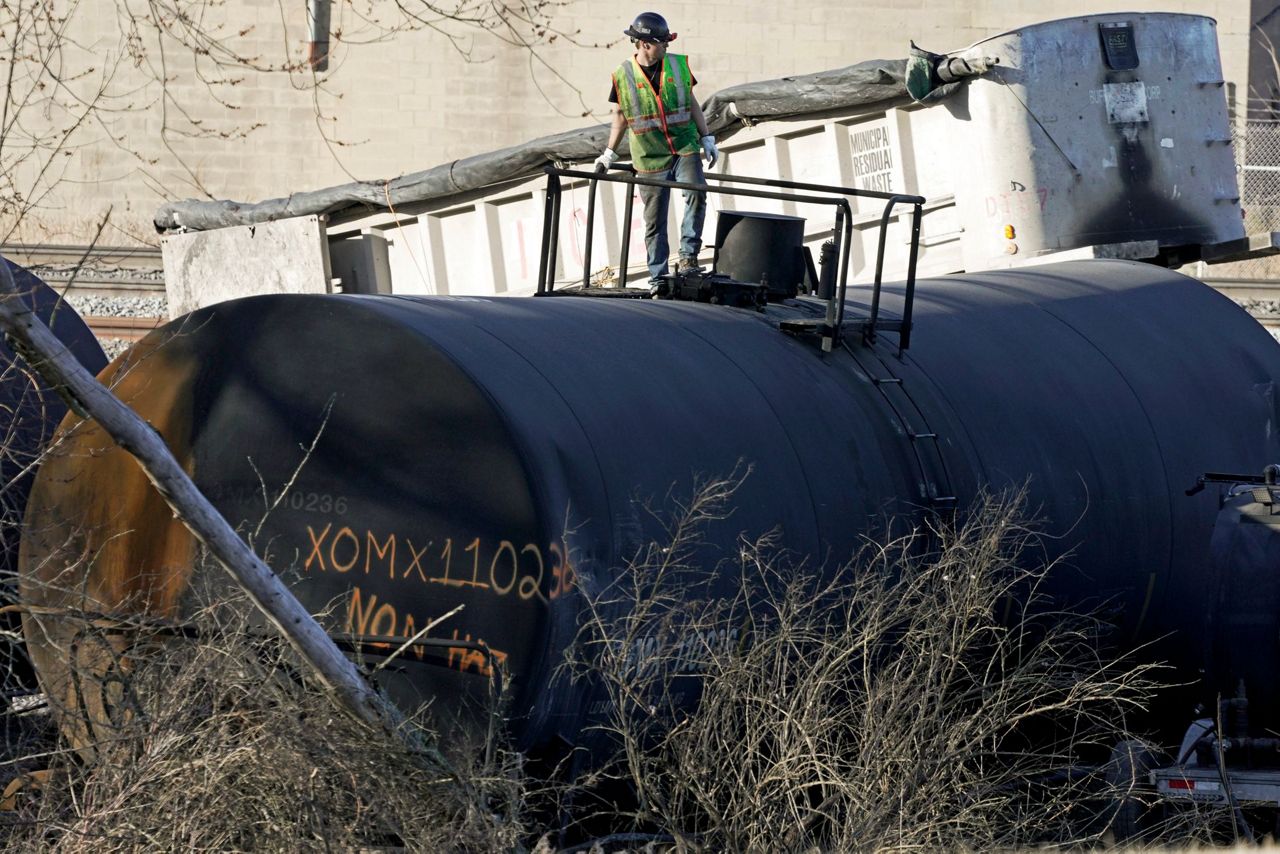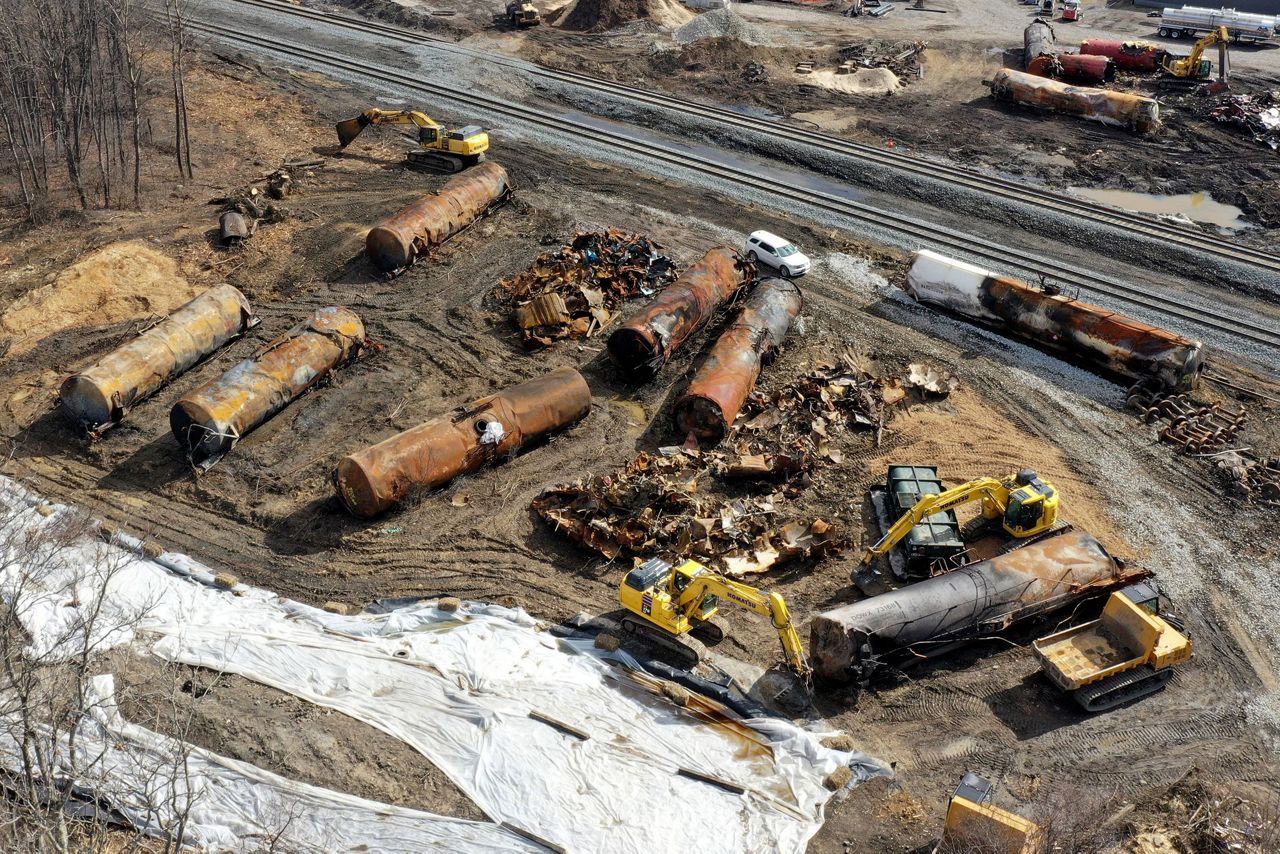Residents who say they're still suffering from illnesses nearly a month after a train carrying toxic chemicals derailed in Ohio confronted the railroad's operator Thursday at a town forum, demanding to know whether they'd be relocated from homes they're afraid to live in.
“It’s not safe here,” said one man, staring straight at representatives of Norfolk Southern. “I’m begging you, by the grace of God, please get our people out of here.”
While the railroad announced it was ready to begin moving more contaminated soil from underneath the tracks, buying homes and moving people out of East Palestine hasn't been discussed, said Darrell Wilson, the railroad’s assistant vice president of government relations.
“Why?" someone shouted.
Few seemed to come away satisfied with answers they heard about air and water testing from state and federal officials — even after the U.S. Environmental Protection Agency said it was ordering Norfolk Southern to begin testing for dioxins, toxic chemical compounds that can stay in the environment for long periods of time.
Many people remain scared about whether the area will be safe for their children years from now, saying they fear that dioxins not yet detected will cause long-term damage. Testing so far by the EPA for “indicator chemicals” has suggested there’s a low chance that dioxins were released from the derailment, the agency said.
Some residents booed, laughed and yelled, “Don't lie to us,” when Debra Shore, a regional administrator with the EPA, reiterated that tests have continually shown that the village's air is safe.
Investigators looking into the fire that erupted after the derailment said it melted a key part of the tank cars filled with toxic chemicals, leading federal officials to warn railcar owners earlier Thursday to check their fleets for similar flaws.
The National Transportation Safety Board said investigators determined the aluminum covers over the pressure relief valves on three of the five tank cars carrying vinyl chloride melted and that some of the metal was found around the valves.
The NTSB said melted aluminum may have degraded the performance of the valves and kept them from releasing some of the flammable gas to relieve pressure inside the tank cars. Norfolk Southern CEO Alan Shaw has said the failure of the valves was part of why officials decided to breach the cars and burn off the vinyl chloride. The resulting toxic fire prompted the evacuation of half of East Palestine, Ohio, and the surrounding area near the Pennsylvania border.
Shaw said the railroad agreed with all the officials responding to the Feb. 3 derailment that venting the hazardous materials cars was the best way to prevent a disastrous explosion.
“The factors on the ground at that time were that the safety valves on the rail cars had failed and the temperatures inside the railcars were heating up," Shaw said. “So, our independent expert was extremely concerned about a catastrophic uncontrolled explosion that would shoot shrapnel and hazardous gas throughout this populated community.”
Wilson told residents that Norfolk Southern feels horrible about what happened. So far, more than 2 million gallons (7.6 million liters) of water and liquid waste have been removed along with 1400 ton (1,270 metric tonnes) of solid waste.
Many people have complained that Norfolk Southern opened the tracks less than a week after the derailment and didn’t remove the soil underneath. The railroad now plans to dig up the areas and should be able to remove all the contaminated soil by the end of April if it’s able to start right away, Wilson said.
That only brought more jeers and angry shouts.
“You should have done it right the first time,” someone yelled.
The Pipeline and Hazardous Materials Safety Administration sent an urgent safety warning out to tank car owners Thursday saying they should check how many of their cars have aluminum covers over the valves like the ones that melted after the Ohio derailment. The agency said car owners should consider switching to steel covers, which is now the industry standard on new tank cars.
It's not clear how many tank cars in use might have aluminum valve covers. The cars with them involved in the derailment were all manufactured in the 1990s.
The derailment prompted many lingering concerns for the roughly 5,000 residents of East Palestine, even though state and federal officials say their tests haven't found any harmful levels of toxic chemicals in the air or water around the derailment.
The NTSB has said that an overheating bearing likely caused the train to derail, sending 38 cars, including 11 containing hazardous materials, off the tracks. A trackside sensor detected the overheating bearing just before the derailment, but the crew didn't have enough time to stop the train.
Ohio Gov. Mike DeWine has said he is focused making sure Norfolk Southern cleans up the mess while helping the town recover, and Shaw agreed to testify in Congress next week at a hearing about the derailment.
Already, members of Congress and the Biden administration have proposed many rail safety reforms, but Norfolk Southern and the other major freight railroads want to wait until after the NTSB completes its investigation a year or more from now to make any significant changes.
The major freight railroads said earlier Thursday they would take one of the steps Transportation Secretary Pete Buttigieg recommended and join a government program that runs a confidential hotline for employees to report safety concerns.
___
Funk reported from Omaha, Nebraska, and Seewer reported from Toledo, Ohio.
Copyright 2023 The Associated Press. All rights reserved. This material may not be published, broadcast, rewritten or redistributed without permission.




